We interviewed two participants of the 2013 Intelligent Sensing Summer School, the first meeting point for PhD students within CIS.
|
Hi Julian and Mark, can I ask you a few questions on the 2013 Intelligent Sensing Summer School?

|
Yes, of course.
|

|
Yes, I very much enjoyed the summer school and found it mostly useful and fun. CIS is something I think is a real benefit to QMUL and should be pushed as far as it can and exposed to as many
PhD students as possible.
|
|
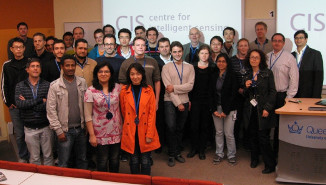
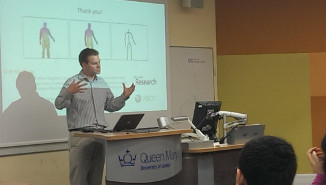
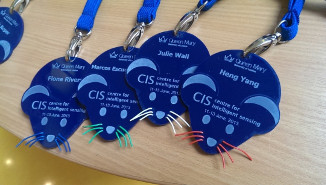
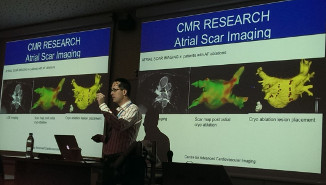
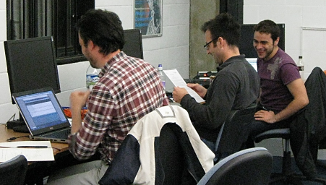
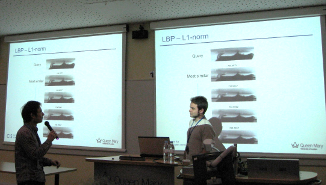
|
Good, so let's start. What did you expect from the Summer School? Did the Summer School meet your expectations?

|
I expected an exposure to other disciplines I wasn't familiar with, and I certainly got this. The way Andrew Spence described the idea of inter-disciplinary
work in the first talk summarised it perfectly: you come into an inter-disciplinary "roundabout" from your particular discipline's "junction" (in my case natural language processing),
you take a few laps with other disciplines (for example, computational vision and biology) and then take your exit back to your field having gained insights which help your work (while hoping you've
done the same for others). I really felt this is what happened at the summer school.
|

|
The CIS summer school was brought to my attention by my co-supervisor Dr Chrisantha Fernando who suggested this might be useful to attend. I originally thought the summer school was based
on computer vision and may be applicable to my research into modelling the visual system of bumblebees. The summer school ended up being a much broader syllabus than simply machine vision,
covering a large range of computer and AI topics with a definite bias in some cases towards their medical applications. I think this was a much better syllabus then simply machine vision however
it is unfortunate that this was not advertised more accurately within the university as very few non computer scientist attended. This is a real shame as different aspects of the course would be
applicable to a whole range of disciplines with some exciting examples of crossovers between fields.
|
|
OK, thank you. Could you please list the three main lessons you learned during the Summer School?

|
The first is that team work is better than individual work - the old mantra that the whole is better than the sum of the parts seems to hold here! - there should be more of this in doctoral work.
The second thing is that computational vision and music seem to share a lot of problems with natural language processing (sparse data, machine learning and generative modelling). Finally, the third is that talking to others in an open way trying to forget the boundaries of your own discipline is useful.
|

|
My main research area is in the neuroscience of the bumblebee brain. The CIS summer school obviously did not cover many aspects of my work, however some of the overview lectures on
machine vision were very useful as background tutorials on the techniques available. In addition the lectures on language provided interesting ways to look at a problem and an inspiration to look
at different ways in which to view my own PhD research.
|
|
Did you meet new interesting people that work in different fields? Which field were they from and how does it overlap with your own area?

|
Yes, as I mentioned earlier, I think music and language from computational and evolutionary perspectives have very much the same problems in many ways.
While arguably language has a more denotational semantics (i.e. the words point to particular objects), the problem of induction of syntax is shared with music. In vision, generative models are common,
in that you need a model of, say, how a mouse's paws move in its running action, to predict where the paws may be in an image where you can't observe them directly, in the same way as you need a generative
model of what language people use to work out what they said when you've never seen the actual word before, or failed to recognize it directly in your speech recognizer. Predictive models learnable from data
are key, as are insights into the 'mechanics' of the processes involved.
|

|
The group project was one of the best aspects of the CIS summer school; I made new friends within my group and by friendly but somewhat fierce competition those on the opposing teams.
The other three members of my team came from the computer science department with two members actually working on vision tracking which was very useful for the mouse-tracking task. Although originally
from a computer science background I believe being the biologist on the team provided an outside non-technical view of the problem and an ability to guide the project to the required goal, and not simply
to solving a programming problem. Achieving second prize in the challenge was very rewarding after all the late nights and hard work we put in but even without this I had an excellent experience bonding with
my team.
I think this is a very important aspect of the CIS to help train disciplines to work together and be able to effectively communicate, but also to show the computer centric side of the teams to view a
problem from the final user’s viewpoint and their requirements. I would definitely design the teams in future years to embrace this idea with a good mix of departments in each group.
It is always useful from a networking viewpoint to meet people on these events and you never know when you may need a particular problem solved or an ear to bounce ideas off.
The challenge was an excellent way to get us to interact and introduce ourselves in a way that you may not do in a purely lecture style scenario.
As a suggestion, I would add to the CIS website a "people's page" where participants can upload their image and research description. On other courses I have attended this has proved very successful
with no one having an issue with providing email details etc. although it is best that this is a closed site for just those participating.
|
|
Did the Summer School help you in gaining a wider knowledge of different topics? If yes, which topics and how will you use this knowledge in your future work?

|
Yes absolutely. Chrisantha Fernando's talk on the Darwinian brain is an exciting research program for getting to the heart of why children are motivated to learn. Andrew Spence's work,
which spawned the challenge part of the summer school, was also a fascinating approach to animal locomotion.
|

|
This summer school was very well designed with a nice diversity in the lectures provided. Although not directly applicable to myself I very much enjoyed the talks by Andrew Spence,
Akram Alomainy and Steffen Petersen as they all gave good examples of the work that is going on within the university (and at other institutions) and how the different disciplines can and should come together.
I know from our student feedback that others may not have thought these lectures were applicable to them but I would strongly recommend that these be retained as it does provide a nice
grounding for the work that goes on and how departments are working together.
Another general comment for the summer school was that the machine vision might be at a too low technical level. Again I would disagree with this. As a non-vision person the course provided
a useful introduction of the techniques that are available and as guidance of where to look for further information should these be required later in my research. If in future years the CIS
summer school can attract a higher proportion of other disciplines then I think the syllabus would be fine, however if there is again a higher proportion of computer scientists then a split
between lower level and more technical lectures may be required.
|
|
Did you get some useful insights for your research? How? Why? - This can refer to the technical, non-technical and any future work

|
Certainly. Tim Hospedales's advice on machine learning was very useful. Looking at competing models, advice for the best data selection and considering what needs to be done before
implementation of these things were very useful, along with the more high-level insights I've mentioned already.
|

|
I think this is not directly applicable to me.
|
|
OK, so finally can you suggest any changes or improvements for the next summer school?

|
I think a slightly more inter-disciplinary challenge could be a good idea. While someone like myself was able to contribute (as Hatice - Hatice Gunes, the summer school organiser, Ed. -
reassured me I could, despite my initial doubts), I think a more general cognitive/biological challenge might be fun. Perhaps programming a robot (i.e. like the very usable NAO interface)
seems to involve aspects of vision, biology, language and communication.
|

|
I very much enjoyed the CIS summer school and found the lectures and material very useful in broadening my general knowledge of what research the university is involved in.
Any criticism/advice is intended only to help design and provide an even more successful course in future years.
Coming from 15 years in industry with a perspective as both a programmer and consultant I have a slightly negative bias towards those coming out of undergraduate Computer Science
degrees who are focused only on programming. I believe it is essential that CS needs to have experience in designing solutions that are viewed correctly from the customer/client’s perspective and needs,
and that the CS individuals have the ability to easily communicate with those clients. On this aspect, I think the CIS summer school was extremely useful: the challenge gave a good example of a
real-world problem, and the feedback at the end of the course and the subsequent meeting was very useful. In some ways, it would have been nice for the challenge to be more tightly interlaced with
the lectures that were given with lecturers providing insight into potential ways to solve the given challenge.
Again I can’t emphasise enough that this summer school should have been advertised to a much wider audience, I think the lectures would have been useful to many PhD students, in addition they
would make a significant contribution to the makeup of the project groups.
I personally would have changed the timing of the project introduction and its final deadline. Although I think the time allocated for the project was perfect such as a very tough schedule
with some very late nights, having lectures on the morning after the first night’s work meant that either students didn’t attend or were mentally incapacitated. Unfortunately,
this is both of little use to 'us', the students, and unfair to those lecturing in the morning. The final early morning deadline was again a major issue for many of us even if, unfortunately,
there is no easy solution to this other than extending the summer school by an additional day. I think that some changes with the next year’s schedule is required to see if this can be improved.
A small note on prize money; this should in future be made available as cash as extracting money from the department was more complicated and long-winded than tracking mice feet on a treadmill -
the task of the challenge, Ed. - :P
Finally I would like to thank all of the organisers and lectures for what I found a very informative and fun few days, and a superb opportunity to meet some of my fellow PhD students
which without this course I would unlikely never have met.
|
|
|
Thanks for your answers and your time. See you at the 2014 Intelligent Sensing Summer School!
|







